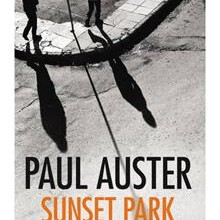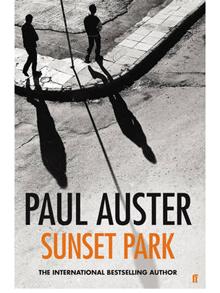#23 Sunset Park by Paul Auster

 I seem to be on a run of male authors at the moment, which is entirely coincidental, I think.
I seem to be on a run of male authors at the moment, which is entirely coincidental, I think.
Paul Auster is new to me, and I was interested in reading about his literary work to learn that he uses certain literary devices – one of which is a twinning or mirroring of circumstance. I certainly spotted a couple of these in Sunset Park … two characters have experienced the death of a child, two have dubious relationships with much younger people etc.
What resonated more than anything with me though, was the range of broken things that feature in the novel. Bing, one of the main characters, runs a ‘Hospital for Broken Things’ but these are not the only destroyed objects in the narrative – the protagonist, Miles, spends his time emptying out (and apparently photographing, although this strand is never developed) foreclosed homes in Florida. Ellen, another character isolates and draws body parts (funnily enough, this theme emerges in another novel I’ve just finished, Parade by Shuichi Yoshida) ever more frenetically as her own mental state fragments into some kind of manic depressive cycle. Morris, father of Miles, laments the destruction of the publishing industry and the collapse of his own small, but – in his eyes – valuable publishing house.
Around all the characters a wider breakdown is occurring; America is breaking under its own strain and each individual’s experience fits into this wider context of the failure of the USA banking industry, irresponsible lending and international recession.
As such, this novel is a beautiful example of the ‘as above, so below’ style of writing. Miles tries to ‘rescue’ a young woman, Pilar, from her empty consumerist lifestyle as typified by her grabby and threatening older sister. His father, Morris, has been trying to rescue America from its blindness to intellectual capital by publishing ‘good’ books. Bing tries to restore outcast and outmoded equipment to useful life. These ‘belows’ take place against an ‘above’ that is causing foreclosures on mortgages, crushing publishing, and – eventually – leads to Bing, Miles, Ellen and others being evicted from their squat in a disastrous fashion. This disaster mirrors the moment in Miles’s life that led to him abandoning his potential future as one of America’s chosen intellectual elite to become a rubbish collector for America’s debt collection industry.
As such, also, it’s quite a chilly read. We’re supposed, I think, to warm to Miles when he falls in love with Pilar … but in fact it’s a creepy relationship at best in which he ‘buys’ her from her family with material goods and then ‘grooms’ her into taking her college entrance exams. Shades of Pocahontas at the least, made even more evident by Pilar’s exotic origins, which introduce ‘colour’ to the novel. Despite the fact that Sunset Park is a depressed neighbourhood and they live in a squat, the four young white people whose stories are told in the novel have little or nothing to do with their African American neighbours – this is a microcosm that is self-consciously a bubble and in that bubble Miles has ethical doubts and regulates his behaviour around Pilar so as not to break the law.
But the wider question of what a well-educated drop out is doing determining the life plan of a much younger woman is used as an instrument of fiction rather than as a literary question about privilege and abuse of power. In the end, Miles is unable to save Pilar because he is unable to save himself, but I think his failure to recognise his own power could have more usefully been explored earlier. Like a delinquent child, America sometimes fails to see how easily it distorts the world around it because it is aware only of its own responses – I feel Auster missed a trick here by failing to finish the job of showing us how easily disaster results from emotional impulses, in personal lives and in international relations.


Recent Comments